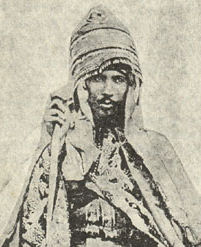1872-1889 Yohannes IV
 The kingdom at Tewodros's death was disorganized, but those contending to succeed him were not prepared to return to the Zemene Mesafint system. One of them, crowned Tekla Giorgis, took over the central part of the highlands. Another, Kasa Mercha, governor of Tigray, declined when offered the title of ras in exchange for recognizing Tekla Giorgis. The third, Menelik of Shewa, came to terms with Tekla Giorgis in return for a promise to respect Shewa's independence. Tekla Giorgis, however, sought to bring Kasa Mercha under his rule but was defeated by a small Tigrayan army equipped with more modern weapons than those possessed by his Gonder forces. Among the many chiefs who shared dominion in the vast warlike kingdom of Ethiopia after the fall of Theodore, Prince Kassa of Tigre emerged conspicuous, and at last came to his throne. In 1872 Kasa Mercha was crowned negusa nagast in a ceremony at the ancient capital of Aksum, taking the throne name of Yohannis IV. The secret of his success was that he made a judicious investment in English muskets.
The kingdom at Tewodros's death was disorganized, but those contending to succeed him were not prepared to return to the Zemene Mesafint system. One of them, crowned Tekla Giorgis, took over the central part of the highlands. Another, Kasa Mercha, governor of Tigray, declined when offered the title of ras in exchange for recognizing Tekla Giorgis. The third, Menelik of Shewa, came to terms with Tekla Giorgis in return for a promise to respect Shewa's independence. Tekla Giorgis, however, sought to bring Kasa Mercha under his rule but was defeated by a small Tigrayan army equipped with more modern weapons than those possessed by his Gonder forces. Among the many chiefs who shared dominion in the vast warlike kingdom of Ethiopia after the fall of Theodore, Prince Kassa of Tigre emerged conspicuous, and at last came to his throne. In 1872 Kasa Mercha was crowned negusa nagast in a ceremony at the ancient capital of Aksum, taking the throne name of Yohannis IV. The secret of his success was that he made a judicious investment in English muskets.
The Emperor Yohannes IV (c.1831 - March 10, 1889), was also known as Yohannis IV, Johannes IV or John IV. Yohannis was unable to exercise control over the nearly independent Shewans until six years later. From the beginning of his reign, he was confronted with the growing power of Menelik, who had proclaimed himself king of Shewa and traced his Solomonic lineage to Lebna Dengel. While Yohannis was struggling against opposing factions in the north, Menelik consolidated his power in Shewa and extended his rule over the Oromo to the south and west. He garrisoned Shewan forces among the Oromo and received military and financial support from them. Despite the acquisition of European firearms, in 1878 Menelik was compelled to submit to Yohannis and to pay tribute; in return, Yohannis recognized Menelik as negus and gave him a free hand in territories to the south of Shewa. This agreement, although only a truce in the long-standing rivalry between Tigray and Shewa, was important to Yohannis, who was preoccupied with foreign enemies and pressures. In many of Yohannis's external struggles, Menelik maintained separate relations with the emperor's enemies and continued to consolidate Shewan authority in order to strengthen his own position. In a subsequent agreement designed to ensure the succession in the line of Yohannis, one of Yohannis's younger sons was married to Zawditu, Menelik's daughter.
In 1875 Yohannis had to meet attacks from Egyptian forces on three fronts. The khedive in Egypt envisioned a "Greater Egypt" that would encompass Ethiopia. In pursuit of this goal, an Egyptian force moved inland from present-day Djibouti but was annihilated by Afar tribesmen. Other Egyptian forces occupied Harer, where they remained for nearly ten years, long after the Egyptian cause had been lost. Tigrayan warriors defeated a more ambitious attack launched from the coastal city of Mitsiwa in which the Egyptian forces were almost completely destroyed. A fourth Egyptian army was decisively defeated in 1876 southwest of Mitsiwa.
Italy was the next source of danger. The Italian government took over the port of Aseb in 1882 from the Rubattino Shipping Company, which had purchased it from a local ruler some years before. Italy's main interest was not the port but the eventual colonization of Ethiopia. In the process, the Italians entered into a long-term relationship with Menelik. The main Italian drive was begun in 1885 from Mitsiwa, which Italy had occupied. From this port, the Italians began to penetrate the hinterland, with British encouragement. In 1887, after the Italians were soundly defeated at Dogali by Ras Alula, the governor of northeastern Tigray, they sent a stronger force into the area.
Yohannis was unable to attend to the Italian threat because of difficulties to the west in Gonder and Gojam. In 1887 Sudanese Muslims, known as Mahdists, made incursions into Gojam and Begemdir and laid waste parts of those provinces. In 1889 the emperor met these forces in the Battle of Metema on the Sudanese border. Although the invaders were defeated, Yohannis himself was fatally wounded, and the Ethiopian forces disintegrated. Just before his death, Yohannis designated one of his sons, Ras Mengesha Yohannis of Tigray, as his successor, but this gesture proved futile, as Menelik successfully claimed the throne in 1889.
|
NEWSLETTER
|
| Join the GlobalSecurity.org mailing list |
|
|
|

